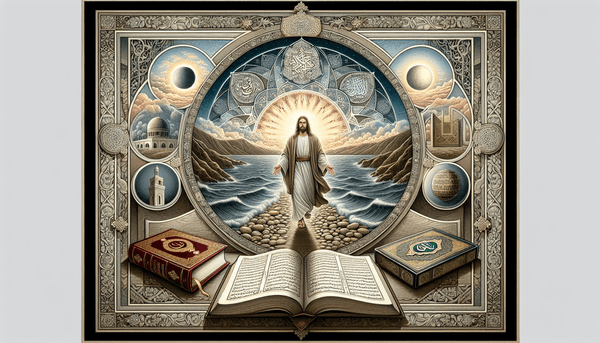False Prophets and Teachings in Christian Scripture
Within the Christian narrative, Jesus frequently warns of the perils posed by false prophets and deceptive teachings. In Matthew 24, he speaks of the end times, cautioning his followers to remain vigilant against those who would lead the faithful astray with false signs and wonders. Jesus emphasizes the need for discernment in spiritual matters, instructing his disciples to recognize true teachers by their fruits, as outlined in Matthew 7:15-20. The Apostle Peter echoes this sentiment, admonishing believers to be wary of false teachers who secretly introduce destructive heresies, as stated in 2 Peter 2:1. This guidance is not to condemn specific religions or prophets but to encourage a steadfast adherence to the teachings of Christ, centered on the greatest commandments: to love God and love one's neighbor as oneself (Matthew 22:36-40). These exhortations highlight the importance of grounding one's faith in love and truth, serving as a bulwark against the tides of misinformation and moral relativism.
Interpretation of 'You Are Gods' in John 10:34
One of the more puzzling statements attributed to Jesus occurs in John 10:34, where he cites Psalm 82:6, saying, 'Is it not written in your Law, 'I have said you are gods'?' This reference, taken from a psalm where God addresses rulers who have been given divine authority to execute justice, speaks to the potential for human beings to reflect divine qualities. The term 'gods' here is understood as an acknowledgment of the divine authority and responsibility bestowed upon humans, rather than a literal equivalence with God. This nuanced interpretation emphasizes the moral and spiritual responsibility that comes with being made in the image of God (imago Dei), as described in Genesis 1:26. It serves as a reminder of the inherent dignity of each person and the call to live in a manner that honors that divine imprint. This passage, while complex, encourages believers to wrestle with the implications of divine nature and human conduct, fostering a deeper understanding of their faith and actions.
Conclusion
As we conclude our exploration of these theological questions, we recognize the depth and diversity that characterize the dialogue between Christian and Islamic beliefs, as well as the internal reflections within Christianity itself. The nature of Jesus, the caution against false prophets, and the interpretation of divinity all serve to deepen our understanding of faith and its practice. It is through such examination that we grow in wisdom and discernment, developing a faith that is both informed and authentic. We are reminded of the value of respectful dialogue and the pursuit of truth within our complex religious landscape. As seekers on this spiritual journey, may we continue to engage with the scriptures and the traditions that shape our understanding of the divine, drawing ever closer to the heart of our faith.
FAQ
Q: Where in the Bible does Jesus state he is God?
A: In the Gospel of John, Jesus makes several statements that have been interpreted as claims of his divinity. For example, in John 10:30, he states, 'I and the Father are one,' and in John 8:58, he declares, 'before Abraham was, I am,' echoing the divine name given to Moses in Exodus 3:14.
Q: What does Jesus warn about false prophets?
A: Jesus warns about false prophets in Matthew 7:15, cautioning that they come in sheep's clothing but inwardly are ravenous wolves, and he urges his followers to be vigilant and discerning.
Q: Does Jesus ever explicitly say that every prophet after him will be false?
A: No, Jesus does not explicitly state that every prophet after him will be false. He warns of false prophets in general and emphasizes the need for discernment.
Q: What did Jesus mean when he said 'you are gods' in John 10:34?
A: In John 10:34, Jesus quotes Psalm 82:6 to illustrate that scripture refers to people as 'gods' in the context of holding divine authority or responsibility, not in terms of being equal with God.






